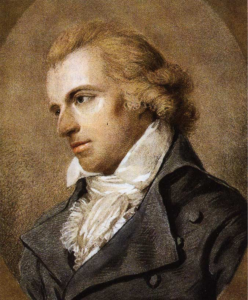Dithyramb / The visit
(Poet's title: Dithyrambe / Der Besuch)
Set by Schubert:
D 47
for Tenor, Bass and chorus[March 29, 1813]
D 801
[June 10, 1826]
Nimmer, das glaubt mir,
Erscheinen die Götter,
Nimmer allein.
Kaum dass ich Bacchus, den lustigen, habe,
Kommt auch schon Amor, der lächelnde Knabe,
Phöbus der Herrliche findet sich ein.
Sie nahen, sie kommen,
Die Himmlischen alle,
Mit Göttern erfüllt sich
Die irdische Halle.
Sagt, wie bewirt ich,
Der Erdegeborne,
Himmlischen Chor?
Schenket mir euer unsterbliches Leben,
Götter, was kann euch der Sterbliche geben?
Hebet zu eurem Olymp mich empor.
Die Freude, sie wohnt nur
In Jupiters Saale,
O füllet mit Nektar,
O reich mir die Schale.
Reich ihm die Schale,
O schenke dem Dichter,
Hebe, nur ein!
Schenke nur ein!
Netz ihm die Augen mit himmlischem Taue,
Dass er den Styx, den verhassten, nicht schaue,
Einer der Unsern sich dünke zu sein.
Sie rauschet, sie perlet,
Die himmlische Quelle,
Der Busen wird ruhig,
Das Auge wird helle.
Never, it seems to me,
Do the gods appear
On their own.
As soon as I am in the company of jolly Bacchus
Amor, the smiling lad, comes along.
The majestic Phoebus appears.
They are approaching, they are coming,
All the heavenly ones.
It is filling up with gods
This earthly hall.
Tell me, how can I entertain them,
Someone like me, born on earth
How can I host a heavenly choir?
Bestow on me your immortality,
You gods! What can a mortal give you?
Lift me up to your Olympus!
Joy lives only
In Jupiter’s halls.
O fill the bowl with nectar
And hand it to me!
Hand him the bowl!
Bestow it on the poet,
Just lift it.
Just pour it out!
Moisten his eyes with heavenly dew
So that he cannot see the hated Styx
And so that he imagines himself to be one of us.
It is babbling and sparkling
– That heavenly spring.
The breast becomes calm
The eye becomes bright.
All translations into English that appear on this website, unless otherwise stated, are by Malcolm Wren. You are free to use them on condition that you acknowledge Malcolm Wren as the translator and schubertsong.uk as the source. Unless otherwise stated, the comments and essays that appear after the texts and translations are by Malcolm Wren and are © Copyright.
☙
Themes and images in this text:
Amor / Cupid The ancient world Apollo / Phoebus Bacchus Chest / breast Dew Eyes Heaven, the sky Heavenly choir Jupiter / Zeus Lethe Nectar Olympus Springs, sources and fountains Wine and vines
A dithyramb is a drinking song, so it is appropriate that the first of the gods to join the party is Bacchus himself. As the poet notes, Amor and Bacchus are inseparable. Dionysus gets the juices going. We are familiar with the stages of drink (‘jolly Bacchus’): affection, humour, attraction (‘Amor, the smiling lad’) and self-confidence, here seen as ‘the majestic Phoebus’ but perhaps experienced by others as pomposity rather than majesty. The ordinary (‘this earthly hall’) seems transformed (‘filled with gods’).
Stanza one is about the guests approaching, arriving and settling in. The poet now begins to feel the stress of being the host. He is conscious of not being up to the job. How can a mortal entertain all these immortals? He has nothing to offer. Real parties and true joy cannot exist here. The host has to become the guest; the bowl needs to be filled with nectar not plonk.
Suddenly the pronouns shift: ‘I’ becomes ‘him’ and ‘they’ become ‘us’. There is a sacramental transformation as the gods welcome the poet as their own guest. He is made to feel as if he is ‘one of us’. He can ‘cross over’ without having to brave the Styx and is given access to the sparkling heavenly spring. His breast becomes calm and his eye bright.
There is no single perspective from which to view what has happened. We can read it is an intense mystical transformation whereby the poet is granted access to a world of calm truth, goodness and beauty, with Schiller using classical imagery to revive and reinvigorate the Christian language of transfiguration and the Eucharist. Or it is an ironic commentary on the process of getting drunk, with the speaker moving through a tipping point from merriment to delusion and ending in a catatonic stupour. It will probably appear to be one or other of these options (or a cocktail of both) depending on what we have been drinking.
☙
Original Spelling
Dithyrambe
Nimmer, das glaubt mir,
Erscheinen die Götter,
Nimmer allein.
Kaum daß ich Bacchus den lustigen habe,
Kommt auch schon Amor, der lächelnde Knabe,
Phöbus der Herrliche findet sich ein,
Sie nahen, sie kommen,
Die Himmlischen alle,
Mit Göttern erfüllt sich
Die irdische Halle.
Sagt, wie bewirth ich,
Der Erdegeborne,
Himmlischen Chor?
Schenket mir euer unsterbliches Leben,
Götter! Was kann euch der Sterbliche geben?
Hebet zu eurem Olymp mich empor!
Die Freude, sie wohnt nur
In Jupiters Saale,
O füllet mit Nektar,
O reich mir die Schale!
Reich ihm die Schale!
O schenke dem Dichter,
Hebe, nur ein.
Netz' ihm die Augen mit himmlischem Thaue,
Daß er den Styx, den verhaßten, nicht schaue,
Einer der Unsern sich dünke zu sein.
Sie rauschet, sie perlet,
Die himmlische Quelle,
Der Busen wird ruhig,
Das Auge wird helle.
Confirmed by Peter Rastl with Musen-Almanach für das Jahr 1797, herausgegeben von Schiller. Tübingen, in der J.G.Cottaischen Buchhandlung, pages 120-121, and with Gedichte von Friederich Schiller, Erster Theil, Leipzig, 1800, bey Siegfried Lebrecht Crusius, pages 151-152.
First published 1797 with the title “Der Besuch” (The visit) in Schiller’s Musen-Almanach
To see an early edition of the text, go to page 119 [125 von 292] here: http://digital.onb.ac.at/OnbViewer/viewer.faces?doc=ABO_%2BZ207858202


